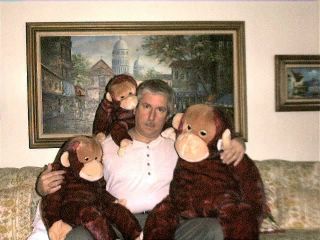Sorcerer's Soup
As ghouls and goblins descend upon us in this Halloween season, the annual question of whether one can be scared to death, or “scared stiff,” whichever you prefer, must once again be posed. The sorcerer’s cauldron froths and boils over, rendering its soup no more toxic than the so-called brain-heart connection. In fact, there is a physiologic basis for strong emotions causing death, when the nervous system becomes so jump-started by serious threat that it can cause heart attack and consequent exitus. Animal studies bear this out. There are also historical precedents to the lethal brain-heart connection, with a Roman emperor, a 13th century pontiff, and American patriots all succumbing to the mortal blows of anger, grief, and elation, respectively.
Both disruptive life events and the chills of Bela Lugosi, Christopher Lee, or Freddie Kruger movie house madness can lead to an inevitable downward spiral in life’s course. The palpitations, heartache, and anxiety wrought by Hollywood make believe can easily parallel similar repercussions of real-life calamities such as the death of someone dear, the threat of death to someone close, the anticipation of a difficult examination, the embarrassing loss of self-respect or self-esteem, the unpleasant memories exhumed during an anniversary memorial service, or the threat of imminent harm or injury in battle. Even the jolt of a happy ending can end miserably, with the strength of the emotions elicited weighing heavily on an “animus et corpus” worn down by neuronal, hormonal, and psychic bombardment.
We have all experienced anxiety at some point in our lives. The adolescent on a first date with an unsightly pimple that just sprang up, the college student about to take a first set of final examinations after pulling an “all-nighter,” the hapless groom about to say “I do,” the postmenopausal woman awaiting biopsy results after a suspicious mammogram, the second-string athlete about to get his chance in the big game, the employee suddenly called in to the boss’s office after rampant rumors of pink slips and company lay-offs, and the list goes on and on, indicating that being human entails a certain amount of heart palpitations, taut nerves, queasy stomachs, cold hands, and downright urges to roll up into the fetal position until the all-clear has been sounded. Until now, however, the latter had been considered nonlethal, par for the course, and attributed to simply living life. Now we know that they can kill you! A study of 3,015 70-79-year-olds, in fact, has demonstrated that not only “the good die young,” as the saying goes, but the anxious also. The more anxious one is, the more he or she is likely to die, with the added twist that anxiety is a greater predictor of death in blacks than in whites.
And what of the million-dollar shrink’s term, “catatonia,” theme of horror movies and idle cocktail chatter? Catatonia is a paralysis that has no apparent physical cause and little physiologically concrete to refer to, except that it may be provoked by fear. On any given day, any one of us can become its victim with no advanced notice, and a study conducted in 2004 suggests that it was originally rooted in our collective DNA to protect our species from being eaten by other animals. Unfortunately, we now know that other kinds of fear, anxiety, or feelings of imminent doom, real or imagined, can lead to catatonia.
Passing from a sorcerer’s soufflé of Ouija boards, tarot cards, horoscopes, pinned effigies, amulets, potions, elixirs, bloodied chicken corpses, and Santeria, we subsequently navigate the singularly turbid waters of Cupid’s domain, where we pose the question of whether one can, indeed, die of a broken heart. Been there, done that, and lived to tell the tale, you say. Perhaps. But consider yourselves fortunate, as failed romance may be just stressful and acute enough to cause heart failure. While people under stress may already have heart disease, who’s to say that the stress of unrequited love is insufficient to cause fatal heart failure? After all, acute stress cardiomyopathy, which resembles a heart attack without actually being one, occurs in non-cardiac patients hospitalized after acute physical or emotional trauma, such as grief for the loss of a loved one or fear resulting from an act of criminal violence or involvement in an automobile accident.
Our account of mind over matter would be found deficient, if we were not to contrapose the concrete to the sublime. Why worry about what we don’t know killing us, when even the innocuousness of castor oil, rhubarb pie, sunflower seeds, and cherry, plum, and peach stones, to mention a few, can put our short time on earth to an even shorter test? Perhaps we should devote our energies and turn our sights toward what can actually kill us, instead of a witch hunt for sensationalism and magic bullets to fell the monsters inhabiting our psyches since the beginning of our time. Wouldn’t resources be better directed at automobile accidents, murder, other accidents, suicide, and cancer in the 15-24-year-old group, cancer, heart disease, and accidents in the 25-45-year-old group, and heart disease, cerebrovascular disease, chronic lung disease, Alzheimer’s, pneumonia, diabetes, and accidents in individuals 65 and older than at shadows, figments, and sounds that go “bump” in the night?
Sorcerer’s, shamans, medicine men, charlatans, and traveling snake-oil vendors are everywhere, now, at Halloween, and whenever. Calling their bluffs, however, in these times of increased evidence of the brain-heart connection, leaves this writer scared stiff!
ã 2009, Albert M. Balesh, M.D. All rights reserved.


0 Comments:
Post a Comment
<< Home